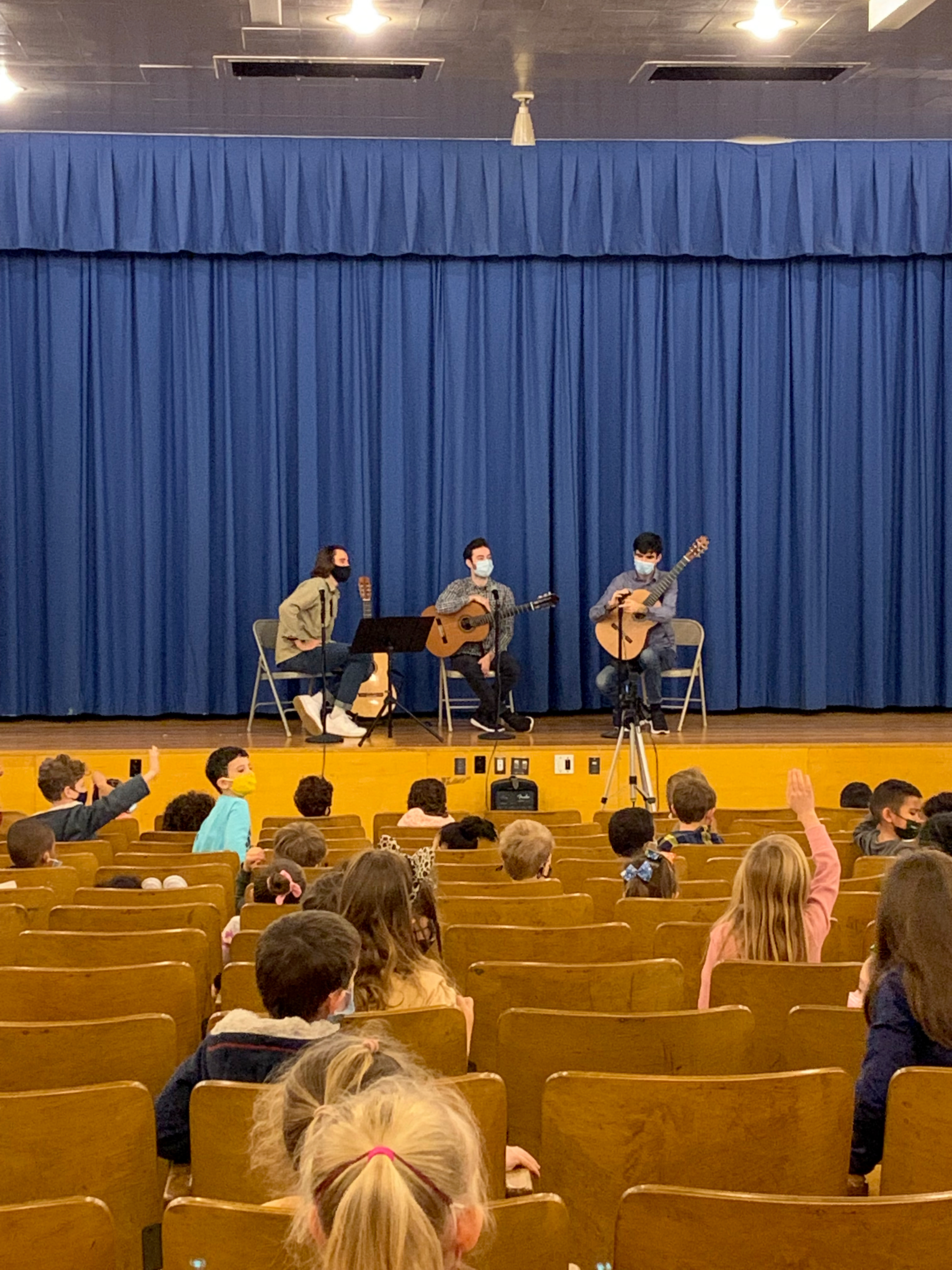Each year, more than 100 Juilliard students participate in the school’s extensive Community Engagement program, which, through a variety of fellowships, create access to artistic and educational experiences throughout New York City.
Second-year master’s guitarist Henry Johnston is a Norma Galblay McCabe Guitar Fellow, and as part of his fellowship this year, he gave two performances at a local elementary school and wrote a script for and recorded a virtual Young People’s Concert. On both occasions, he collaborated with guitar alums Ziggy and Miles Johnston (both MM ’21), who are brothers and not related to Henry though they have the same last name.
This article is part of a series of end-of-year student reflections
By Henry Johnston
Juilliard students have lofty goals. They plan to become the best of the best. They aim to headline the greatest venues, conduct the most famous orchestras, and star in the grandest productions. Many of them will achieve these ambitions, working relentlessly year after year until they succeed. Much of this work is done behind closed doors in the practice room or in the studio.

Once in a while, a performance opportunity allows an audience to see whatever it is the performer has been working on. This audience often consists largely of connoisseurs who have been attending events like these for years. Indeed, many of the attendees are artists themselves, equipped with the knowledge to immediately appreciate what is happening onstage. The performance concludes, and on the way home the attendees discuss the merits and demerits of what they have just witnessed.
“I found the pacing of the third movement to be sluggish. Isn’t it marked poco animato?”
“Yes, her rubato was rather indulgent at times—but what an exquisite sul tasto!”
While these details certainly warrant discussion, it is important to keep in mind that most people won’t have a clue what these two are talking about or what difference it makes.
Of course, there is much more to appreciating the arts than being familiar with tempo markings or bowing techniques, and the spontaneous and powerful reactions that performances can and often do elicit from an unsuspecting audience are not to be discounted. That said, more can be done to ensure that performers are engaging with audiences in meaningful ways and that audiences keep coming back. And there is much more that performers can do to bring the benefit of the arts to a wider audience by seeking new ways to interact with the community. In doing so, the performer may empower the audience to engage with the arts in their own way.
Juilliard has an entire office devoted to this idea—the Office of Community Engagement, which curates performances that provide a meaningful and memorable experience for audiences who otherwise might not have had the chance to see whatever is being performed. In addition to schools, performances are held in hospitals, care homes, prisons, and other such venues. A good community engagement performance showcases the value of the arts in a universally accessible way. The task of designing such a program falls to the performer. In order to accomplish this, the performer must tailor the experience to the audience. In designing such a program this past year, I developed a few guidelines for myself.
- Assume nothing.
- Understand that it is the job of the performer to tap into the collective consciousness of the audience in a way that aids their understanding of the ideas being explored. This may involve demonstration, analogy, question and answer, the creation of a game, or all of the above—don’t be afraid to try something new or unconventional.
- Finally: Show, don’t tell. Illustrate your ideas imaginatively and concretely.
I have learned that when done properly, this method cultivates an opportunity for any audience to get the very most out of a performance. Better yet, on the way home, audience members can discuss it and relate to it in meaningful ways, regardless of their age, prior familiarity, or pre-existing interest; the potential for edification is maximized.
We Juilliard students will always have grand aspirations. My hope, though, is that in chasing these goals, we will not forget what a privilege it is to bring the arts beyond traditional concert halls and into the community. Through the careful consideration of the way we share our work, we can create this chance for any audience.
Guitarist Henry Johnston received his master’s degree in May